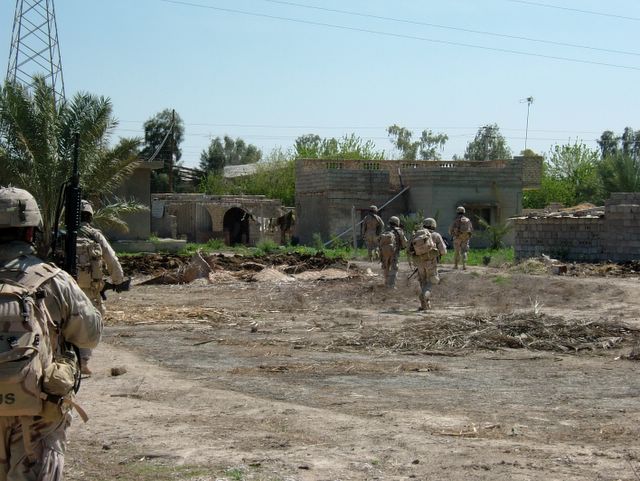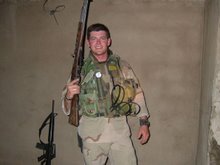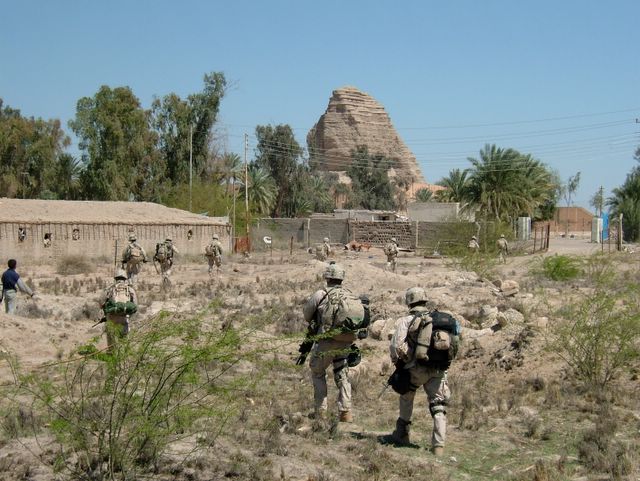Pentagon to move troops into Kuwait
By LOLITA C. BALDOR, Associated Press Writer
WASHINGTON - The U.S. military is planning to move a brigade of troops into Kuwait in what could be the first step of a short-term surge of American forces into Iraq to stabilize the violence.
The 2nd Brigade of the 82nd Airborne Division is expected in Kuwait shortly after the new year, a senior Defense Department official told The Associated Press on Friday. The official requested anonymity because the plans had not yet been announced.
The 2nd Brigade, made up of roughly 3,500 troops, is based at Fort Bragg, N.C., and would be deployed in Iraq early next year if needed, the official said. The move would be part of an effort to boost the number of U.S. troops in Iraq for a short time, the official said. The plan was first reported by CBS News.
In a half-hour video conference with President Bush on Friday, Iraqi Prime Minister Nouri al-Maliki outlined plans for the national reconciliation conference taking place in Baghdad on Saturday. Al-Maliki cited the desire of many people in Iraq for a larger core of Iraqi political leaders to come together for the common objective of stabilizing the country and promoting the rule of law, National Security Council spokesman Gordon Johndroe said in describing the conversation.
Al-Maliki also talked with Bush about providing greater security, in particular in Baghdad, by going after all sources of violence, including insurgents and militias, Johndroe said. Bush reiterated his support for al-Maliki and said he was encouraged by the meetings he had recently with Iraq's Sunni vice president, Tariq al-Hashemi, and with the leader of the largest Shiite bloc in Iraq's parliament, Abdul-Aziz al-Hakim.
In assessing the state of the war in Iraq, Bush has been meeting this week with top generals and other advisers. The military options being considered include an increased effort to train and equip Iraqi forces.
Meanwhile, the commander of U.S. forces in the strife-ridden Iraqi province of Diyala said Friday that tribal leaders and some political groups in the province are turning to terrorists and insurgents for protection rather than trust Iraqi soldiers and police.
"This sort of unity only worsens the sectarian divide and encourages further violence," said Col. David Sutherland, commander of the 3rd Brigade, 1st Cavalry Division. He spoke to reporters at the Pentagon by a satellite video connection from his headquarters near the city of Baqouba, northeast of Baghdad.
"Public perceptions of corruption, inequity and fear are the driving force behind support to terrorist organizations," Sutherland added. "These are not new problems in Iraq but problems that developed out of a desire for personal and financial gain."
Sutherland said he is trying to turn that around by putting Iraqi police through more rigorous training, placing more U.S. advisers in the Iraqi army and police units and through Iraqi efforts to recruit a police and army force that better reflects the sectarian makeup of Diyala, which is about 55 percent Sunni, 30 percent Shiite and 15 percent Kurd.
Currently, the Iraqi security forces in Diyala are predominantly Shiite, he said.
Sutherland said he is working out arrangements to expand the use of U.S. adviser teams with Iraqi security forces, reflecting the view of senior U.S. commanders that such an expansion can speed the development of competent Iraqi forces.
The Army is considering ways it can speed up the creation of two additional combat brigades — a move intended to expand the pool of active-duty combat brigades in order to relieve some of the strain on the Army from large-scale deployments to Iraq.
Under the plan being developed, the new brigades could be formed next year and be ready to be sent to Iraq in 2008, defense officials told The Associated Press. The officials spoke on condition of anonymity because the plans were not final.
The Army's chief of staff, Gen. Peter J. Schoomaker, told a commission Thursday that he wants to increase the half-million-member force beyond the 30,000 troops authorized in recent years. And he warned that the Army "will break" without thousands more active duty troops and greater use of the reserves.












